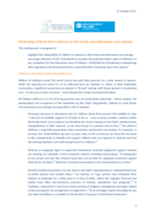Demographic Data
|
Sources: World Bank, UNDP, UNAIDS, DHS 2013 |
Displaying 12721 - 12730 of 14390
This briefing note, produced by an Interagency Working Group on children without parental care, is designed to highlight the vulnerability of children to violence in the family and alternative care settings, and to encourage members of the CAT Committee to consider the potential added value of reference to the Guidelines for the Alternative Care of Children.
The Training, Support and Development (TSD) standards form part of a foster carer's induction into the role. They provide a national minimum benchmark that sets out what foster carers should know, understand and be able to do within the first 12-18 months after being approved.
In this TED video, Georgette Mulheir, CEO of Lumos, an NGO dedicated to ending worldwide systematic institutionalization, describes how orphanages can cause irreparable damage to children both mentally and physically and urges to end reliance on them by finding alternate ways of supporting children in need.
This is a short animation movie produced by the Child Protection Working Group for the launch of the "Minimum Standards for Child Protection in Humanitarian Action". It tells the story of Samira, who became separated from her family during an emergency and found child protection workers who were able to locate her family and reunify them.
This paper provides insight into child protection in the context of coordinated action, the architecture of U.S. government assistance, the state of evidence-base, development of appropriate research framework, practice and policy, ethical considerations, and capacity development and knowledge transfer for those advocating for children outside of family care. Recommendations are made to consider how current operational contexts, collaborative relationships and learning-knowledge can be united to focus on the various categories of children outside of family care.
In this TED Talk, poet and playwright Lemn Sissay tells his story of growing up in foster care in the UK.
This article reviews the available evidence regarding the efficacy, effectiveness, ethics, and sustainability of approaches to strengthen systems to care for and protect children living outside of family care in low- and middle-income countries.
This article reviews the U.S. Government Evidence Summit on Protecting Children Outside of Family Care held in December 2011 in Washington D.C. The Summit brought together more than 150 of the world’s leading advocates for children to examine the strength of the research evidence on existing programs and interventions, and most importantly to identify critical knowledge gaps and areas where more research is needed so that systems and programs designed to improve the overall health and well-being of these vulnerable children may be strengthened.
The purpose of this review was to identify evidence-based early response strategies and interventions for improving the outcomes of children outside of family care, including children of and on the street, institutionalized children, trafficked children, and children affected by conflict and disaster, and who are exploited for their labor. A conclusion was drawn that there is a strong need for strengthening the evidence base regarding the effectiveness or early assessments and responses to children living outside family care and for using evidence to guide operational policy and practice.
Care related section of the Government of the Republic of Indonesia's third and fourth combined report on the implementation of the Convention on the Rights of the Child (dated 18th October 2012).



